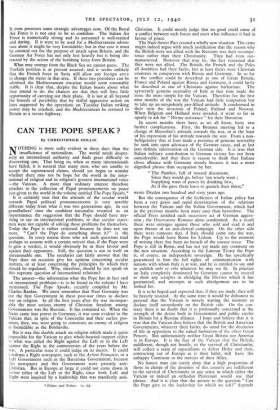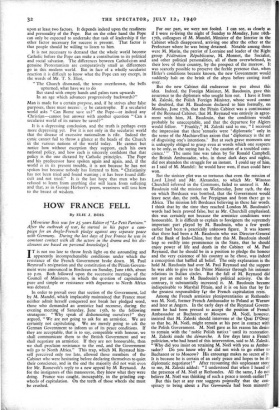CAN THE POPE SPEAK ?
By CHRISTOPHER HOLLIS
NOTHING is more sadly evident in these days than the insufficiency of nationalism. The world needs desper- ately an international authority and finds great difficulty in discovering one. That being so, when so many internationals have failed, it is natural that many men, who are unable to accept the supernatural claims, should yet begin to wonder whether there may not be hope for the world in the inter- national of religion and in religion's greatest international voice —the Vatican. A more than ordinary interest therefore attaches to the collection of Papal pronouncements on peace just given to the world in the volume entitled The Pope Speaks.* It is certainly true that the attitude of the secular world towards Papal political pronouncements is very notably different today from what it was two generations ago. In our grandfathers' time the confident nationalist resented as an impertinence the suggestion that the Pope should have any- thing to say on international problems, or that secular states- men were not capable of solving those problems for themselves. Today the Pope is rather criticised because he does not say more. " Can't the Pope do something about it?" is the question. In every nation those who ask such questions tend perhaps to assume with a certain naiveté that, if the Pope were to give a verdict, it would obviously be in their favour and against their opponents. Still, the question is not in itself an unreasonable one. The secularist can fairly answer that the Pope does on occasion give his opinion concerning secular matters, or at least concerning the principles by which they should be regulated. Why, therefore, should he not speak on this supreme question of international relations?
The answer—the information what the Pope has in fact said on international problems—is to be found in the volume I have mentioned, The Pope Speaks, recently compiled by Mr. Charles Rankin. We must remember that Nazi Germany was not the first Government in these post-war times to declare war on religion. In all the first years after the war incompar- ably the most serious enemy of Christian freedom among Governments was the Russian. It has remained so. When the Nazis came into power in Germany, it was soon evident to the Vatican that, in spite of the Concordat and their earlier pro- mises, they, too, were going to constitute an enemy of religion as formidable as the Bolsheviks.
But it was this double attack on religion which made it quite impossible for the Vatican to give whole-hearted support either to what was called the Right against the Left or to the Left against the Right in the controversies of the years before the war. A particular issue it could judge on its merits. It could condemn a Right newspaper, such as the Action Franfaise, or a Left Government such as the Barcelona Government, because this newspaper and this Government were patently anti- Christian. But in Europe at large it could not come down in favour either of the Left or the Right, since both Left and Right were inspired by a leadership that was manifestly anti- * Faber and Faber. 7s. 6d. Christian. It could merely judge that no good could come of a conflict between such forces and exert what influence it had in favour of peace.
The Nazi-Soviet Pact created a wholly new situation. The cynic might indeed argue with much justification that the reason why the British were not allied with the Russians was their incompe- tence rather than their Christianity. They had been out- manoeuvred. However that may be, the fact remained that they were not allied. The British, the French and the Poles all doubtless had their faults, but at least theirs were Christian countries in comparison with Russia and Germany. In so far as the conflict could be described as one of Great Britain, France and Poland against Russia and Germany, it could fairly be described as one of Christians against barbarians. The apparently genuine neutrality of Italy at that time made the issue the more simple for the Vatican. Therefore for the first nine months of the war the Vatican had little temptation but to take up an outspokenly pro-Allied attitude. It condemned in their turn the invasions of Poland, Finland and Norway. When Belgium and Holland were invaded, it went so far as openly to ask for " Divine assistance " for their liberation.
In recent months there have, as we all know, been two further complications. First, the Brenner meeting led to a change of Mussolini's attitude towards the war, or at the least of his expression of his attitude towards the war. From a non- belligerency that at least made a pretence of genuine neutrality he sank into open advocacy of the German cause, and at last into definite intervention on the German side. It is true that Italian military contribution to German victory has not been considerable, and that there is reason to think that Italians chose alliance with Germany merely because it was a more dignified phrase than occupation by her.
" The Panther, full of inward discontent, Since they would go, before 'em wisely went ; Supplying want of power by drinking first, As if she gave them leave to quench their thirst," wrote Dryden two hundred and sixty years ago.
But the consequence oT the feebleness of Italian policy has been a very grave and rapid deterioration of the relations between the Vatican and the Italian Government, which had in the previous months been more easy than heretofore. The official Press justified each successive act of German aggres- sion ; the Osservatore Romano alone condemned. As a result there were outrages against those who sold and read it and open threats of an anti-clerical campaign. On the other side there were rumours that, if Italy should come into the war, the Pope would leave Rome for Lisbon. Up to the moment of writing there has been no breach of the uneasy truce. The Pope is still in Rome, and has not yet made any comment on the new situation. According to the Lateran Treaty the Pope is, of course, an independent sovereign. He has specifically guaranteed to him the full rights of communication with nations with whom Italy is at war, and he is entitled to say and to publish urbi et orbi whatever he may see fit. In practice an Italy completely dominated by Germany cannot be trusted to show any scruples in abridging the liberties which it has guaranteed, and attempts at such abridgement are to be looked for.
It is to be hoped and expected that, if they are made, they will be bravely resisted. At the same time it would be dishonest to pretend that the Vatican is merely waiting the moment to declare itself outspokenly on the British side. On the con- trary there is no doubt that it is profoundly concerned at the strength of the desire both in Government and public circles in Britain for a Russian alliance. I hope and believe that it is true that the Vatican does believe that the British and American Governments, whatever their faults, do stand for the decencies of life in opposition to the naked barbarism of the other Great Powers. But unfortunately neither Great Britain nor America is in Europe. It is the fear of the Vatican that the British, indifferent, though not hostile, to the survival of Christianity, will collect a team of rapscallions to defeat Hitler and then, contracting out of Europe as is their habit, will leave the unhappy Continent to the mercies of their Allies.
No honest man can surely deny that a high proportion of those in charge of the destinies of this country are indifferent to the survival of Christianity in any sense in which either the Vatican or indeed an orthodox Protestant would use that phrase. And it is clear that the answer to the question " Can the Pope give us the leadership for which we ask?" depends upon at least two factors. It depends indeed upon the readiness and personality of the Pope. But on the other hand the Pope can only be expected to undertake that task of leadership if the other factor necessary for success is present. That factor is that people should be willing to listen to him.
It is not necessary to demand that the whole world become Catholic before the Pope can make a contribution to its political and social salvation. The differences between Catholicism and genuine Protestantism are comparatively small as differences go in this modern world. But in face of a wholly secularist reaction it is difficult to know what the Pope can say except, in the words of Mr. T. S. Eliot, " The Church disowned, the tower overthrown, the bells upturned, what have we to do But stand with empty hands and palms turn upwards In an age which advances progressively backwards?"
Man is made for a certain purpose, and, if he strives after false purposes, there must necess:-.., iy be catastrophe. If a secularist world asks " Can Rome save us?" the Pope—or indeed any Christian—cannot but answer with another question " Can a secularist world of its nature be saved?"
It is a depressing conclusion, and the truth is perhaps even more depressing yet. For it is not only in the secularist world that the disease of excessive nationalism is rife. Indeed the cynic cannot fail to throw a glance at the heads of the Church in the various nations of the world today. He cannot but notice how without exception they support, each his own national policy, and how each is sincerely confident that that policy is the one dictated by Catholic principles. The Pope and his predecessor have spoken again and again, and, if the world is in its present trouble, it is not because he has not spoken but because nobody has listened to him. " Christianity has not been tried and found wanting ; it has been found diffi- cult and not tried." It is the last hope that man who has refused to learn from anything else will learn from suffering and that, as in George Herbert's poem, weariness will toss him to the breast of wisdom.



























 Previous page
Previous page